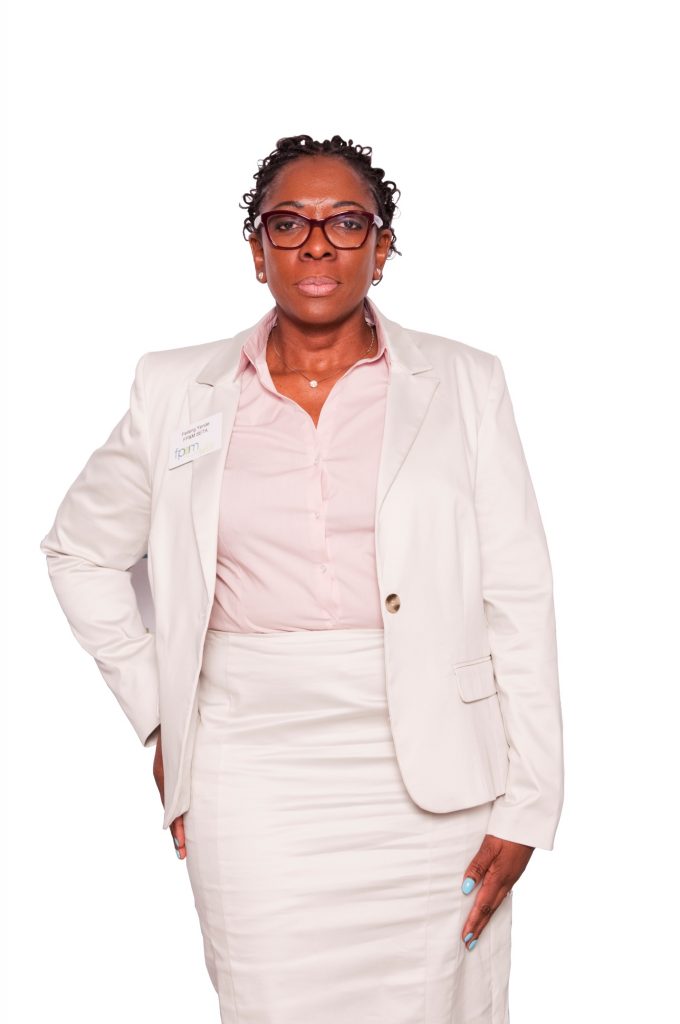As younger women across regions have begun to learn from both the mistakes and strides of the older generation; and identifying the urgent need to have people to look up to on their journey towards career excellence, it is necessary that they look up to healthy role models who will feed them with positive messages which will groom them.
This was one of the numerous advises Ms Felleng Yende, the CEO of The Fibre Processing and Manufacturing (FP&M) SETA South Africa gave in an exclusive interview with Amazons Watch Magazine.
With about 15 years in active service, Ms Yende speaks about her passion for skill development as well as poverty alleviation in Africa. Excerpt:
In a few sentences, please describe the person of FELLENG YENDE.
Ms Yende is a dynamic, strategic leader who is focused on making a meaningful contribution towards transformation and the upliftment of women and the previously disadvantaged. Ms Yende values hard work and is passionate about skills development initiatives that provide opportunities to the youth of South Africa in order to nurture our country’s future leaders.
Give a brief history of how your career started?
Giving my social work background, experience and primary qualifications, my formative years in my career started in employee wellness, social work and transformation management in government departments and public entities. From 08/2002 -01/2004, I was employed by SAPS as Gauteng EAP, Chief Social Worker, Transformation Manager. I then moved to SAPO (Transnet) in Richards Bay in 02/2004 to 08/2005 as EAP Manager focusing on EAP and strategic management of the HIV-AIDS strategy. I progressed to a higher level and strategic positions within the public sector by occupying the position of BEE Researcher in the Department of Public Works in 2005 and was selected the best student. Giving that I was nominated as the best research student, my career in the public sector really took-off when I was appointed Deputy Director: CSR & HIV Aids in the Gauteng Department of Agriculture in 2006.
Armed with a wealth of experience, knowledge and confidence in the Government sector, I then decided to take on bigger challenges in the consultancy space, becoming Group Transformation Manager for PWC and Lafarge between 2006 and 2010. This is where I started to engage with stakeholders at a global and international level on matters such as the execution and implementation of the Mining Charter, Transformation and BEE. The pinnacle of my success was when I was appointed Head of Transformation at a multinational and global organization BHP Billiton, managing strategic corporate investments business cases and delivering high impact results with an enormous budget that spanned millions of rand. This position required high-level stakeholder engagement and relationship management between BHP Billiton, NGO’s and Government Ministries.
What are some of the challenges you have encountered as a woman in the top executive position?
Traditional perceptions of women are a fundamental challenge. The typical qualities of a leader include assertiveness and authoritativeness which is seen to be acceptable for men but unattractive or abrasive for women. It is difficult to break these perceptions. You needed to work extra hard and always put in a little more effort to be recognized.
Since the establishment of (FP&M) SETA in 2011, how would you say the organization has fared in delivering on its mandates?
Since my appointment as Chief Executive Officer of the FP&M SETA 3 years ago, the organization had achieved 3 consecutive unqualified audit opinions from the Auditor-General of South Africa.
The introduction of a highly strategic business model developed by myself paved the way for a complete turnaround and the streamlining of the SETA’s operations & processes. The overall performance of the FP&M SETA increased to 86.2%. This has resulted in the establishment of a best practice organization that has met and exceeded organizational objectives and performance standards.
I am pleased to inform all of our stakeholders that strategically we are fully aligned to supporting Government in addressing the MTEF priorities, most especially unemployment and poverty alleviation. In order to promote labour absorption within our sub-sectors, we have encouraged our industry partners to develop sector strategies aligned to skills development action plans that would promote economic growth & sustainability of our industries.
The FP&M SETA’s financial performance has improved steadily with significant strides being made to ensure adequate financial and administrative controls to deliver prudent financial management with strict adherence to generally accepted accounting practices and National Treasury Regulations. Financial prudence is the cornerstone to financial effectiveness and efficiencies. I have put measures in place to ensure optimal financial prudence and no wasteful expenditure within the organization. In implementing the new business model, I have adopted a “decentralized” strategy to project management, thus ensuring quicker turnaround of projects from project initiation to close-out.
Our research partnership with WITS University has yielded excellent results – everything we do at the SETA is informed and underpinned by research. Key to the success of this intervention has been empirical research activities undertaken in collaboration with our research partners to identify the occupations in demand within our sector. Through this initiative, we will also be able to create a pool of high-level black researchers. The SETA has an extensive performance management system in place to monitor and review the overall performance of staff. Performance agreements are aligned to key performance areas and targets of personnel. The Performance Management System is aligned to the performance standards of the organizations and an employee performance rewards scheme.
For the organization, the business models set out clear delivery mechanisms to enable the organisation to deliver on time and to standard on its commitments as set out in the Annual Performance Plan.
It is my objective to drive high organizational performance in the FP&M SETA that will result in the SETA being recognized as an effective and credible skills development partner ensuring delivery of service excellence. The SETA has an extensive performance management system in place to monitor and review the overall performance of staff. Performance agreements are aligned to key performance areas and targets of personnel. The Performance Management System is aligned to the performance standards of the organizations and an employee performance rewards scheme.
Training is a core aspect of the activities at FP&M SETA. Thus far what will you say are some of the benefits of such procedures?
In line with government’s plan to improve the skills and employability of our youth, the FP&M SETA focuses on facilitating skills development initiatives that not only contribute to the skill levels of learners, but that also make a difference in terms of reducing the gender gap in the workplace, uplifting women in our society and creating a capable workforce that is a fair representation of the country’s demographics. Through skills development, we are able to help the youth become employed or start their businesses. Many of our skills development projects focus on empowering the previously disadvantaged in our country and we continuously seek opportunities to provide extra value to individuals, communities and society at large.
Mandatory Grant submissions have increased steadily over the years, and the number of learners entering learning programmes has increased by 22% over the period, with a total of 36,154 learners. Of those who entered, 16,582 learners were certified.
As one of the organizations championing gender equality in the workspace how would you rate the effectiveness and technical capability of women in your organization?
As the CEO of the organization and being a female myself I place great emphasis on empowering my staff and my executive team. Most proponents of more women in management/leadership start by talking about the qualities women bring to the workplace that makes them better managers: Imagination, Intuition, Inventiveness, Innovation and Involvement. The “strong people” skills possessed by women leaders enable them to read situations accurately and take in information from all sides. This willingness to see all sides of a situation enhances their persuasive ability.
What in your opinion is the most pressing issue faced by African women today?
There are numerous pressing issues facing African women – lack of access to education, poor retention of young girls in school, gender-based violence, detrimental cultural practices and limited participation of women in politics and in the private sector especially, are all equally important issues that must be addressed. The protection of women’s human rights across the continent must be addressed.
In Africa, where the status of women and their public participation has significantly improved over the last 17 years, the problem of not breaking through the glass ceiling and the gender-based challenges the few women in top positions face remains a topical issue.
For example, in South Africa, which occupies the second spot in Africa in terms of women’s representation and participation in politics, the issue of women accessing top leadership positions especially in the private sector persists, as women are only 24% in economic decision-making positions in both the public and private sectors (SADC Gender Protocol, 2010). Indeed, the last 17 years of democracy in South Africa has also come with its challenges for women empowerment in terms of mainstreaming women into the key or top leadership/management positions in both the public and private sectors.
In spite of efforts at transforming both the country and the public service to embrace national priorities of development and economic growth, challenges persist for women across the public and private sectors. For example, while women have the potential and ability to be leaders, they often lack opportunities, resources and support for realizing their potential. And this is not peculiar to the private sector where women in leadership are fewer. It also applies to the public sector where there are more women entering leadership positions in South Africa.

What is your take on the issue of marginalization against women across regions? Do you believe it still exists? How can it be tackled?
Yes, I believe it still exists. Even when they are eminently qualified and in spite of the mainstreaming of more women into public life in the last 17 years (1995 – 2012), women remain discriminated against in terms of accessing top management/leadership positions. This is even though more women are getting educated and hold more jobs worldwide than ever before.
However, most women continue to suffer from occupational segregation in the workplace and rarely break through the so-called glass ceiling in public life which separates them from top-level management and professional positions. Again, even the few that push through to occupy top leadership/management positions face serious challenges that can and do circumscribe their performance in these positions. This is a serious concern as it reinforces existing stereotypes of women’s ability to perform at the top level of public life and thus perpetuates a vicious cycle of marginalization and disempowerment of women.
If you were to give three pieces of advice to young women who aspire to fly high in their chosen fields of endeavour what will they be?
The next generation of women is bombarded with so much pressure from the media and their peers. More than ever before, they need positive messages from healthy role models
- Find a support system that works for you. Look for people who share and encourage your ambitions and who can help and mentor you to find your unique strengths and talents. Form a support network of “career advisors”.
- Network. Attend events in the industry you want to be in and network with those who are working in the industry and promote yourself to them. Don’t be afraid to speak about your accomplishments and skills. Nurture the relationships you make.
- Don’t be afraid to speak up. Learn to ask and negotiate for what you want. Negotiating is key to advancing your career. Practice it until it works for you.
Spread your wings and fly even in adversity!
What’s the best way for the readers of Amazons Watch Magazine to connect with you?
Website: www.fpmseta.org.za
Twitter: @FPMSETA
Facebook: FP&M SETA




